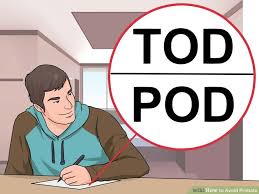All Wills Must Be Probated
Whether or not you have an estate plan in place, you have likely heard the term “probate”. Probate is the legal process by which a deceased individual’s assets are distributed under court supervision. This process is required to distribute assets that are titled solely in the name of the deceased person. Probate is governed by state law. That means all probate actions are set forth in the Florida Probate Code, and those provisions must be followed by the probate lawyer and the personal representative ("executor") of the Florida probate estate.
Avoiding Probate
One of the appealing aspects of putting together a properly designed estate plan is to safely avoid probate, yet retain control of your assets during life and at death. One way to avoid the probate process is to ensure that no assets will be titled in the decedent’s name, or providing for an automatic transfer of title, at death. Ways to accomplish this include joint tenancy with rights of survivorship, transfer-on-death (TOD) or payable-on-death (POD) beneficiaries, or use of a trust. The revocable living trust is the most frequently used type of trust used to avoid probate.
Joint Ownership of Assets
Joint ownership is easy to create and transfer property; however, this solution provides its own set of concerns. There are many potential pitfalls to using joint ownership of assets. The first question is which of the various methods of joint ownership is most appropriate for your circumstances. In Florida, there are at least three different types of joint ownership: (1) tenants by the entirety; (2) joint tenants with right of survivorship, and (3) tenants in common. Each form of joint ownership has its own issues that should be considered when deciding whether to use a particular form of ownership. The pitfalls of jointly owned assets is a topic that is far to extensive to include in this discussion and deserves its own post.
TOD and POD Accounts

TOD and POD accounts can be efficient because, upon the account owner’s death, the account assets are immediately transferred to the named beneficiary, outside of probate. These types of accounts are easy (and typically free) to set up.
It is important to note; however, that in this case, the account is transferred to the beneficiary outright, immediately upon the death of the account owner, without any creditor protection, or protection from the beneficiary's divorcing spouse, outside creditors, the beneficiary's incapacity (whether temporary or permanent), or the beneficiary's imprudent decision-making and lack of financial responsibility.
Equally important, in some cases, there is no option for a "contingent" beneficiary in the event the named beneficiary should predecease the original account owner. It is not obvious from the payable on death beneficiary designation what happens if the named beneficiary is not alive when the transfer of ownership occurs. At a minimum you should name a contingent beneficiary. Even then, experience shows that the named beneficiaries may not survive the account owner.
The determination of who receives the account is usually contained in the financial institution's terms, policies and conditions. Your account contract will usually (buried deep into the document) identify what happens when there is no named beneficiary to receive the account. Options for the disposition of such an account include to the beneficiary's heirs at law, or the beneficiary's estate, or to the other named beneficiaries, or perhaps to the account holder's probate estate. Again, the use of transfer on death, payable on death, or other types of beneficiary designations, are sufficiently complex that they deserve their own post to describe the potential pitfalls of beneficiary designations.
Life Estate Deeds
An option for transferring interests in real property at the death of the owner of the real property, without the necessity for probate, is to use a "life estate deed." Life estate deeds come in two common flavors: (1) a life estate deed; (2) an enhanced life estate deed.
Both the life estate deed and the enhanced life estate deed (sometimes called a "lady bird deed"), require the naming of designated beneficiaries for the transfer of ownership of the real property upon the death of the original owner(s) of the real property. All of the issues discussed above about the pitfalls of beneficiary designations, also apply to the life estate deeds.
However, with the use of life estate deeds, the person originally owning the real property has the option to describe what happens to the real property in the event the original named beneficiaries are not alive at the time of the original real estate owner's death. However, if the owner of the real property fails to discuss with the attorney (estate planning, probate, trust, or real estate lawyer) the proper desire with regard to the appointment of the beneficiary's successor beneficiaries, then an unwanted result could occur. The attorney you choose will make a difference in how you deal with successive levels of beneficiary designations. An experienced estate planning attorney can help you make the right decision.
A Revocable Living Trust Can Avoid Probate

Another popular and, perhaps the most efficient way to avoid probate, is the use of a trust, and in particular a revocable living trust. If you place (re-title) your assets in a trust, the trust, not you, owns legal title to all the asset. Although you can control these assets and benefit from them as if they were yours, legally the assets are titled to the trust. Accordingly, the assets do not go through probate! Under Florida law, only property actually owned by and titled directly to the deceased person is required to go through the probate process.
Note: If your estate planning consists of just a will, this document will go through the probate process. All Last Will and Testaments, must go through probate. However, by using a will, you have the ability to determine who will get your assets-as opposed to letting the court decide for you.
Benefits & Downsides of Probate
While there are numerous estate planning tools that can be used to avoid probate, it is not always a bad thing. A probate court can ensure that your intentions and wishes listed in your will are carried out after your passing. Additionally, the probate process guarantees all presented debts are discharged as well as any outstanding taxes on the estate. This, in turn, results in finality to the affairs of the deceased -and surviving family members. Of note, if the deceased had outstanding debt, the probate process gives creditors only a brief window to file a claim against the estate, which could result in more debt forgiveness if there is a concern about the estate being insolvent.
That being said, there are downsides to the probate process. One such downside is the cost. Due to the filing and inventory fees imposed by the probate courts, this is an additional expense eating away at the estate. Also, the probate process can be very time consuming. The probate must be open for a minimum period of time (in many states it is four months) to permit creditors to file claims against the estate.
For most uncomplicated probate estates, it will take a minimum of one year to administer.
Additionally, the lack of privacy can be a concern for some families. The contents of your will, and any other documents that have to be filed with the probate court, will be a matter of public record. Any disgruntled family member wondering how your estate was divided up, will have the ability to get access to the documents through the probate process. Lastly, the probate process takes control away from the deceased and the family. This is because, if you do not have a will, the probate process puts the disbursement of a deceased’s assets in the hands of the court and at the mercy of the Florida intestacy law.
Get Advice from a Probate Attorney or Estate Planning Lawyer
If you have questions about the probate process and intestacy laws in Florida, feel free to give us, your Palm Coast Probate Attorney, a call and schedule an appointment. No matter if you have a little or a lot, a well crafted estate plan can help you avoid probate and make sure your loved ones are taken care of when you are gone.
